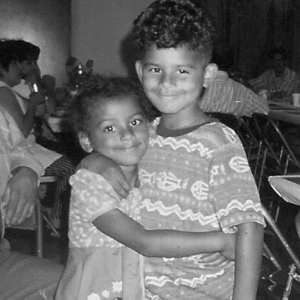The first time I heard the phrase ‘social determinants of health’—the nonmedical factors that influence a person’s health—I was in graduate school. I was rapt as my professor described the conditions that make it more difficult for people to maintain or improve their health, such as lack of reliable transportation, unsafe housing, unsteady employment, lack of internet access, and many, many more.
Immediately, I started thinking about my family.
Like 60 million other Americans, I grew up in a multi-generational household with my grandparents, mother, and two brothers. We didn’t go to the doctor or dentist regularly since we went back and forth between being insured and uninsured. Even when we did have insurance, we lived in a rural part of California and at times shared vehicles so getting to appointments could be difficult. We also didn’t have internet access in our home to Google symptoms or learn about illnesses or health issues we were experiencing.

For us, and for a lot of Americans, that’s just how it is, and it’s just something you deal with.
This meant when my older brother was in the early stages of developing a substance use disorder, no one recognized that’s what was happening, so he didn’t get treatment. When he was able to get a diagnosis of schizophrenia, it became even more apparent that the things I thought of as status quo were barriers preventing my brother from getting care. Ultimately, my brother experienced many of the issues people with mental illnesses and substance use disorders do. He didn’t complete high school, he experienced being unhoused, and he had interactions with the criminal legal system.
My brother now lives in a care home, though this care isn’t because of a change in my family’s access to resources, but because of a legal ruling. We know he is safe; our family can be in contact with him, and he receives health care. But the path that led to where he is today took 11 years, a lot of heartache, and luck (if you can call it that).
When I started to have my own mental health struggles, the difference between having resources and not became starker. I was able to go to college and was starting to build a career in health communications. Though I didn’t make a lot of money, I had more resources than I’d had before, and I managed stress by running. However, in 2017, I got injured while training for a marathon and needed surgery. Though the surgery was successful, my running career was over. Overnight, I lost my free outlet for managing stress and navigating the ups and downs of life.
By the middle of 2018, I wanted to sleep all the time—and was often groggy and sad—and I started using alcohol to help me sleep and have fun. My boss suggested I go to the doctor to see if I had an autoimmune disorder or iron deficiency. It took about 15 minutes for a doctor to figure out what was causing my fatigue and difficulty sleeping – depression and anxiety. We discussed trying medication for treatment, and he told me managing my depression and anxiety would likely reduce my dependence on alcohol; he prescribed me Naltrexone to help with that too.

Five years later I feel so much better — I have the tools to manage my mental health and a healthier relationship with alcohol. Because I had the tools and resources to get care in the early stages of my illness, I didn’t experience the detrimental or long-lasting effects having an untreated mental illness can sometimes lead to.
Looking back, I feel incredibly lucky for the experience I had, and I believe it should be that easy for anyone who needs any kind of medical care. I also feel sad and angry that my brother couldn’t get the care he needed and deserved.
I’m proud to have a lived experience that helps me start conversations with health care leaders about how we can work to break down sometimes invisible barriers to improve health equity. When we have people at the table who know firsthand the challenges people experience and who are willing to use their voice and their story to make change, we can work toward a world where everyone has the tools to improve their mental health—no matter what their lived experience looks like.


